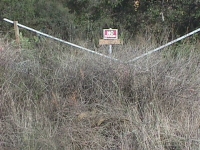By Richard Darvas
 $63,000 bill stemming from $25,000 weed abatement charge raises questions over fire district's use of private contractor
$63,000 bill stemming from $25,000 weed abatement charge raises questions over fire district's use of private contractor
May 3, 2010 (Dehesa)--As World War II drew to its nuclear close, Joseph Diliberti was born in Brooklyn, N.Y., to Sicilian parents. From an early age, however, Diliberti discovered his perennial roots in nature. Whether crab fishing in Long Island or hunting in upstate New York, outdoor activities were a family affair.
“I love this ‘cause I feel like I’m home,” the retiree observes several decades later, as he traces his arm in a circular motion to indicate his present rural home in Dehesa.
 Today, he reclines in a lawn chair before a handmade adobe with arched entryways and stained glass windows, wearing a purple Rastafarian head wrap and a gray beard with curls that extend down to his sun-beaten chest. There’s a multi-level wooden tree house perched about 20 feet high in the foreground. An adjacent ceramic house—built with flotsam from a demolished tower—stands nearest to the roadway and contains a sunroom and meditation room. Clay kilns breathe warmth into at least two of the structures. A thin stream purls on the far side.
Today, he reclines in a lawn chair before a handmade adobe with arched entryways and stained glass windows, wearing a purple Rastafarian head wrap and a gray beard with curls that extend down to his sun-beaten chest. There’s a multi-level wooden tree house perched about 20 feet high in the foreground. An adjacent ceramic house—built with flotsam from a demolished tower—stands nearest to the roadway and contains a sunroom and meditation room. Clay kilns breathe warmth into at least two of the structures. A thin stream purls on the far side.
A veteran’s journey home
 Diliberti’s journey to craft these remarkable dwellings began when he left New York at age 18, draft papers in hand. In Vietnam, land patrols, ambushes and firefights exposed him to the ravages of war.
Diliberti’s journey to craft these remarkable dwellings began when he left New York at age 18, draft papers in hand. In Vietnam, land patrols, ambushes and firefights exposed him to the ravages of war.
“People were just dropping dead all around--bombs falling, napalm, thousand-pound bombs. You ever see napalm fall?” he asks. “ It’ll blow you away. Thousand-pound bombs put holes in the ground, man...Right now, if we were bombed and you were shot through the head, I couldn’t have any time to say ‘Ah, man, I’m sorry my brother.’….You can’t deal with your emotions….but they don’t leave. They just wait. It’s like a dream that you have that you can’t deal with.”
After serving two years in the Marine Corps, Lance Cpl. Diliberti was honorably discharged. Settling down in San Diego, he says he enrolled in junior college, married and started a small business doing brickwork, carpentry and other odd jobs. Soon, his startup gained traction through word of mouth and began to flourish. It paid for multiple homes and a comfortable life for him and his family. By age 35, however, he recognized that he was burned out.
At a crossroads, Diliberti made a bold choice. He struck out and headed south through Mexico and into Guatemala. There he observed people living simply, off the land. “They had no stores, but they sure had a nice dinner plate,” he muses, “So when I came home I decided to come to this land [Dehesa] and live a simpler way.”
Diliberti purchased 3.7 acres in East County in 1978. Since 1979 it has been his permanent home. But the wreckage of Vietnam never left his consciousness. He explains that communing with nature led to greater introspection. This unorthodox lifestyle served as a gateway to the healing process.
“It was here on the land that I started going inward, started to see the trauma that I dealt with and how I’d never really dealt with it….Then my daughter called me and said I should see a Vietnam doctor about that, and I did. They started giving me psychological treatments, and they started realizing I was in pretty deep shit…I went for a whole year. I was diagnosed with PTSD.”
At home in nature, Diliberti eventually learned how to sculpt structures with earth, straw, water and fire through trial-and-error experimentation and anecdotal information. Wooden hexagonal moulds created bricks that could be interlocked into larger architecture. These took shape as flat walls and curvilinear designs.
All in all, Diliberti estimates he has made seven structures—without ever applying for a building permit—throughout the time he has owned his land.
After an ornate pagoda was ordered torn down by county officials several years ago because it was not up to code, he says other buildings were saved through reclassification as “non-habitable art structures.” As a consequence, none of these creations can now serve as livable spaces.
County crackdown on weeds aimed to prevent wildfires, but outsourcing raises concerns—and costs
 Since 1979 he has occupied these grounds. But now Diliberti is now in jeopardy of losing his haven to an upcoming sale at public auction due to an unpaid weed-abatement bill that stems back to 2004.
Since 1979 he has occupied these grounds. But now Diliberti is now in jeopardy of losing his haven to an upcoming sale at public auction due to an unpaid weed-abatement bill that stems back to 2004.
Brush management, in a nutshell, mandates that residents clear spaces in and around their properties to create firebreaks near structures and reduce an oncoming fire’s fuel load. Topography, vegetation growth and population density are only some of the key variables. It is local fire agencies’ responsibility to ensure that homeowners are abiding by these weed-abatement standards.
In 1978, Proposition 13 passed to considerable fanfare. It revolutionized California’s tax law by locking in property assessments, thereby limiting property taxation. A long-term consequence of this initiative is sharp losses in tax revenue that funds public education, essential services and other public works.
 In the aftermath of the unprecedented Cedar Fire in October 2003, East County’s outliers were particularly cognizant of the threat of wildfires. A Cal Fire report published soon after that wildfire lists the acres burned at 273,246, plus 4,910 structures destroyed or damaged and 15 total fatalities. The National Fire Protection Association puts the damage at $1.1 billion. Areas of Lakeside and Dehesa were especially hard-hit. In fact, two homes immediately surrounding Diliberti’s property were burned, but his property escaped the fire’s path. Suddenly, brush management was more of a public priority than ever before.
In the aftermath of the unprecedented Cedar Fire in October 2003, East County’s outliers were particularly cognizant of the threat of wildfires. A Cal Fire report published soon after that wildfire lists the acres burned at 273,246, plus 4,910 structures destroyed or damaged and 15 total fatalities. The National Fire Protection Association puts the damage at $1.1 billion. Areas of Lakeside and Dehesa were especially hard-hit. In fact, two homes immediately surrounding Diliberti’s property were burned, but his property escaped the fire’s path. Suddenly, brush management was more of a public priority than ever before.
To local fire agencies in San Diego County, the principles of brush management are nothing new. They’re a vital aspect of fire protection. However, how does a single, cash-strapped fire agency like East County’s San Diego Rural Fire Protection District (RFD) execute a multi-pronged policy over a jurisdiction encompassing 720 square miles, not to mention countless homeowners? It employs a private contractor.
“Our fire district is a post-Prop. 13 fire district,” explains RFD’s Division Chief Dave Nissen. “So we receive about 2% of the 1% property tax…What that means is we get a pretty miserable share of the property taxes.”
 A private contractor, Fire Prevention Services (FPS) was founded in 1995. Kenny Osborn, FPS’ president, says the company also began contracting with San Diego County fire districts in 1995. According to the company’s website, it handles “weed abatement, brush management and public nuisance.”
A private contractor, Fire Prevention Services (FPS) was founded in 1995. Kenny Osborn, FPS’ president, says the company also began contracting with San Diego County fire districts in 1995. According to the company’s website, it handles “weed abatement, brush management and public nuisance.”
Hazard Reduction Ordinance 2002-02 was first adopted by RFD’s board of directors as a vegetation management program in the summer of 2002. This fire ordinance established the first set of weed-abatement guidelines in the fire district’s jurisdiction. That year RFD marked the beginning of its two-and-a-half-year business relationship with FPS.
“We hear about other fire districts that are using Fire Prevention Services,” Nissen recalls. “It’s a no-cost service to the fire agency that contracts with them. And they’ll do your inspections. That’s the greatest thing since sliced bread to a fire chief and a board of directors, because we’re going to accomplish two things. One, there’s no money, and two, we’re going to have an element of fire-safe communities based upon vegetation management.”
While Osborn states that the majority of FPS’ contracts are awarded through competitive bids, Nissen says that RFD entered into a sole-source contract with FPS. “There’s nobody else that performs those same services,” Nissen explains. “So it was advertised; they were sole source.” Osborn concludes that contractual terms are not uniform and can vary from fire agency to fire agency.
FPS was tasked with a weed-abatement assessment on Diliberti’s 3.7-acre property in late 2003.
On December 9, 2003, a citizen complaint was lodged against Diliberti, based on an FPS summary report produced by the contractor for RFD. An initial inspection was made on December 12, and the “property was found to be in violation.” Per the report a 30-day notice was mailed that day. “The 30-day notification is the only one required by law,” Osborn offers. Re-inspection occurred on January 13, 2004. Two days later, a certified letter containing a 10-day final notice was mailed to Diliberti by FPS. A photocopy of the letter is included in the summary report, postmarked January 15, 2004. Cal Hendrie, RFD’s battalion chief and fire marshal, authorized FPS’ weed-abatement work order on Diliberti’s residence.
During three days, March 3-5, a labor crew of at least 10 people, according to Osborn, performed the field work. The report indicates Diliberti “was mailed a bill at contracted rates” on March 8, 2004. A final bill was mailed March 26.

It totaled $25,500.
Two services and two fees are itemized in FPS’ summary report. Debris remediation (at a $28.00 rate per cubic yard of material) amounted to $23,660 for 845 cubic yards. All material was chipped; there were no dump fees. Hand labor (at a $0.08 rate per square foot of area abated) amounted to $1,480 for 18,000 square feet. Administrative and forced-abatement fees were charged at $250 each. RFD authorized $25,500 of the original $25,640 tally.
Coincidentally, FPS’ aforementioned rates have increased in other regions throughout San Diego County, according to current schedules of fees posted on the contractor’s website. For example, in El Cajon, National City and San Miguel, the rate for hand labor is listed at $0.10 and the rate for debris remediation is listed at $38.00.
Notification questioned
Diliberti claims he had no foreknowledge that a weed abatement had been ordered or performed on his residence until after he returned from an extended vacation. In addition, he says he didn’t know about the abatement bill until his $850 annual tax bill jumped to over $26,000.
When a parcel owner failed to pay FPS for a forced abatement, a condition of its contract with RFD allowed the contractor to “request a special assessment through the District.” Once granted by the fire district, the County’s tax collector’s reimbursed FPS through RFD. Subsequently, a special assessment was placed on the tax bill in the form of a lien.
Diliberti is not one to wait by the mailbox. “Is it against the law not to open your mailbox for a couple or three months if you don’t have no bills?” he openly wonders. “Is it? Or is it against the law to take the trash—‘cause it’s all trash in my mailbox—wrap in all up and burn it? Is it against the law to burn your own mail without reading it?”
After the Cedar Fire, Diliberti’s describes his land as “full of ash.” He says he swept it away, but gradually he became sick through inhalation of particulates. So he says he left. “I was in Mexico on my kayak for three weeks.” He says he returned to the U.S. and stayed in Escondido with his daughter for four days, all the while never visiting his property. Then he boarded a plane bound for San Francisco. “I stayed in San Francisco for three weeks.”
 Richard Halsey, director of the nonprofit California Chaparral Institute (CCI), has become an outspoken advocate on Diliberti’s behalf. CCI’s website alleges that FPS entered Diliberti’s property “without permission or adequate notice.”
Richard Halsey, director of the nonprofit California Chaparral Institute (CCI), has become an outspoken advocate on Diliberti’s behalf. CCI’s website alleges that FPS entered Diliberti’s property “without permission or adequate notice.”
However, court records document Diliberti’s appearance in East County courtrooms during FPS’ notification process. On January 5, 8, 14, 15 and 27 of 2004, judgment minutes indicate that Diliberti was “present with counsel” in connection to alleged building code infractions on his property. A final plea was entered on January 27.
None of FPS’ contracts with any fire agency require face-to-face contact with property owners. “It’s just not practical,” says Osborn. In about half of its weed abatements, Osborn estimates FPS enters private property without face-to-face contact. He cites vacant land, bankruptcies and foreclosures as the primary reasons.
On March 3, 2005, Diliberti filed a civil suit against FPS, RFD, the County of San Diego and other specified individuals. In his formal complaint, he alleged that FPS entered his property “without proper notice and unnecessarily, searched through art objects, removed plants and destroyed animal habitat unnecessarily, damaged the drip line that supplied water of [sic] plaintiff’s fruit trees and plants, destroying same.” Furthermore, Diliberti sought damages for mental anguish in the amount of $100,000. Over three years of court proceedings and a trial ultimately resulted in a judgment for the defendants on July 23, 2008.
Officials defend actions, critics denounce high costs of cutting weeds
If damage occurred on Diliberti’s property, Osborn says FPS “would’ve asked for the opportunity to correct or remedy it…And that claim was raised in court, of property damage, and it was unfounded. There was no proof presented at trial that we caused any property damage at all.” Osborn states that other allegations raised in court were equally untrue. “He could not prove one item in trial.”
“Our company paid to have his property cleaned,” Osborn adds. “Had he wanted to negotiate it back then, was there room for negotiation for working out a payment deal? You bet there was. If we don’t have to carry this debt for a year, you bet there’s negotiation room. He chose litigation, and trust me, I’ve spent way more than $25,000 litigating this.”
Dilberti “wasn’t aware of all the administrative remedies,” Halsey counters. “So he did what a lot of people do: hire an attorney.”
“There was no justice in court,” Diliberti laments.
In preparation for a cost confirmation hearing with FPS on August 3, 2004, RFD submitted a parcel list to the contractor in connection to the weed-abatement program. Out of 50 parcels, Diliberti’s deficit was higher than any other debtor readily identifiable as an individual homeowner.
The next highest was $10,038 lower than Diliberti’s. By the date of the letter, July 9, 2004, his bill had risen to $27, 552. At that juncture, the median cost of weed-abatement bills among a group of 42 (identifiable as individual citizens) was $3,677. Consequently, Diliberti’s financial responsibility was higher than seven times the average.
Not including Diliberti’s, there were seven other parcels that were deemed in violation of RFD’s weed-abatement ordinance within 1,000 feet of Diliberti’s residence during the same period, Osborn remembers. All seven homeowners complied with FPS’ letter except Diliberti. “His was the only one the district ordered us to abate.”
A close neighbor of Diliberti’s, who wishes to preserve anonymity in order to maintain goodwill among other neighbors, reveals that the husband and wife opted to do the work themselves on a 12-acre property. “We spent about $3,500 on renting saws, chippers, tools, truck, etc…We complied with the recommendations of the letter.”
Halsey and others have suggested that Diliberti’s bill was exorbitant. “It’s an absurd amount of money to pay for that work,” Nissen admits of the $25,500 charge. “We want people to comply with these clearance standards. And it was an obscene amount of money that was charged, but the fire district doesn’t want to get into the business of land management.”
 Augie Ghio, San Miguel Fire District’s (SMFD) fire chief, has partnered with FPS for the last 10 years on weed abatement. He agrees that discrepancies in cost function as an incentive. “It is more expensive to go through Fire Prevention Services to mitigate the brush and weed issues than doing it yourself,” he notes. Both Ghio and Nissen affirm, however, that there is no punitive design to the FPS’ service rates.
Augie Ghio, San Miguel Fire District’s (SMFD) fire chief, has partnered with FPS for the last 10 years on weed abatement. He agrees that discrepancies in cost function as an incentive. “It is more expensive to go through Fire Prevention Services to mitigate the brush and weed issues than doing it yourself,” he notes. Both Ghio and Nissen affirm, however, that there is no punitive design to the FPS’ service rates.
Osborn states that a private-sector business must contemplate a more volatile pricing structure when contracting with governmental agencies. “Typically speaking, on our private market, if we go out to do a private weed-abatement job for somebody, about 98% of that job is weed abatement, about 2% is administrative. If we go out and do a forced abatement, it’s about 50/50. At least 50% of our expenses in the administration of the contract overall….So for an area like Rural, our fees have to incorporate all of our costs into performing that contract.” Insurance requirements, inspections, photography, travel, legal fees, and temporary debt loads are administrative costs that Osborn says must be offset in FPS’ rates.
He presents an allusion to further illustrate his position. “A private abatement is going to Rite Aid and buying a Band-Aid; a forced abatement is going to the hospital for the Band-Aid. Same Band-Aid, but it’s not going through the same process, and it’s not being distributed in the same fashion. Our services are the same way.”
“The bottom line is the proposal that we submitted to the fire district stipulated the rates that we would charge,” Osborn concludes.
FPS is not compensated when residents honor its clearance orders and no forced abatement is performed. This high incidence of voluntary action is common in SMFD, says Ghio. “Last year out of about 1,200 [inspections], about 30 did not comply.”
Diliberti’s outlooks dim as officials refuse to reduce fines or halt sale of his property
What began as $25,500 in 2004 has ballooned to over $63,000 on the treasurer’s roll of tax-defaulted properties in 2010. In the nearly five years since Diliberti has been in arrears on his property taxes, a series of penalties has been tacked on. County Treasurer Dan McAllister describes the system. “If somebody doesn’t make their payments in a timely fashion, there’s a 10% penalty, immediately.” Prolonged default status can result in a “new 18% per year penalty,” according to the treasurer.
“It’s pretty onerous,” McAllister concedes. “It adds up.”
Tax-defaulted properties such as Diliberti’s which are not paid in full or enrolled in a five-year payment plan are subject to the tax assessor’s power to sell on July 1, 2010. This date, however, does not coincide with a public auction. “There’s nothing magical about July 1, except that it starts the process every year for us to go into this power-to-sell process,” McAllister explains. “In the November-December timeframe, the list of remaining properties that haven’t been redeemed will go to the Board of Supervisors for approval.” The public auction’s official date for these tax-defaulted properties is slated for March 18, 2011.
Halsey unequivocally holds the San Diego Board of Supervisors responsible for Diliberti’s predicament. “After Prop. 13, the County—unlike all the other counties in the state—got out of the fire business. They chucked the responsibility for fire protection to all the local entities. Well, they don’t have any money. And there’s money coming into the County from Prop. 172, which is a public safety initiative.” Proposition 172 was passed in 1993 and dedicated a half-cent sales tax to California’s public safety. “There was no county fire department here, so the DA and Sherriff’s Department got all that money,” Halsey continues. “The County should let loose of some of that money and put it into fire. They won’t do it. They just won’t do it.” Halsey comments that taxation is the only real method to fund fire protection adequately, but it hasn’t been effectively sold to the public.
In Halsey’s opinion, the region’s fire agencies are underfunded and overextended. Private contractors step into the void. “I have talked to hundreds of people in California in the fire service. Not one of ‘em doesn’t roll their eyes when I mention San Diego County. We’re considered the welfare county of the state in terms of fire [service]….So now you’ve got these fire districts that don’t have money to do what they have to do. They have to do bake sales to get their engines repaired.”
This sentiment is echoed by other fire officials, including Nissen. “Probably the biggest issue that we’re dealing with right now is funding,” says Nissen of RFD. Ghio offers insights about the cost-benefit analysis that necessitates the utilization of for-profit entities. “We made a conscious decision to stay with this [FPS] contract when I got here because it is so cost-effective and efficient for supporting our brush management and mitigation issues in this district. We actually looked at other ways to do it, and couldn’t find a cheaper, more efficient way. If we were going to do it ourselves, when we did the research in 2006, it was going to cost us anywhere from $60,000 to $90,000 more without the effectiveness that Fire Prevention Services does through the contract.”
Oversight is a feature of weed-abatement protocol that Halsey and others openly question. Osborn acknowledges that this presents challenges in terms of public perception, but says that redundancies are specifically written into each fire district’s contractual language to prevent abuses. Moreover, he stresses that safeguards were firmly in place during Diliberti’s abatement. “On February 19, 2004, Chief Hendrie physically looked at the property and ordered the abatement.” Nissen corroborates this detail. After a base $5,000 service bill was incurred, every additional incremental increase of $5,000 required a special work authorization. Diliberti’s property received four—all approved by Hendrie according to Osborn. Ghio says SMFD takes a similar hands-on approach. “Nothing gets done on mitigation until we go out there and verify and validate that there is actually a problem.” Osborn reiterates this point. “We are not the ones that make the ultimate decision on the property getting cleaned or not. That is left up to the governmental agency.”
During the last 10 years, FPS has been named in at least 35 civil lawsuits filed in San Diego County. Osborn speculates that the forced nature of abatements can create a greater likelihood of litigation. “Some of these [lawsuits] are about the right to go onto somebody’s property,” he adds. While a few did not, Osborn recognizes that the majority corresponded to weed abatements. And he notes that FPS prevailed in most cases.
Currently, Osborn counts 11 fire agencies as contractual partners in weed abatement. He says that government contracts account for between 30% and 50% of FPS’ total annual revenue. Yet FPS’s profit margin does not overwhelm, according to Osborn. “We’re pretty close to having more liabilities than assets.”
He also says that FPS’ record is unblemished by any termination initiated by a fire agency. Nissen’s contention that RFD cut ties with FPS of its own accord seems to contradict Osborn’s claim. He outlines multiple reasons why RFD ended their contract with FPS.
“There was a host of folks who had been abated that were unhappy. As you can imagine, nobody wants their property abated. They were unhappy with how we were doing this process….We took a hard look at [the 2002-02 ordinance]. After it was implemented we see that this was an ordinance that was probably a lot more suited to an urbanized setting, rather than a rural one. The third reason was to be consistent with the County of San Diego, with whom we had a long-term partnership on a number of different levels. We adopted their weed-abatement ordinance, which still gives us the ability to do abatements.”
Through the County’s enforcement structure, however, Nissen reveals RFD may still utilize private entities from an approved contractors list on forced weed abatements. Pam Elias, the chief of the County’s Department of Planning and Land Use’s (DPLU) Code Enforcement Division, named four such private contractors via email.
DPLU’s Public Affairs Officer Gig Conaughton characterizes parts of the County’s weed-abatement program as follows. Firefighters conduct vegetation-clearance inspections, not private contractors. “The fire agency notifies the property owner to let them know there is a fire hazard that needs clearing,” Conaughton writes. “Under our new system, we post a notice of abatement on the property AND send a letter to the property owner’s last known legal address.” In regard to oversight, the county has “Code Enforcement folks go out with the company doing the abatement to watch—to make sure that the work is being done in accordance with the contractual agreement.”
San Diego County adopted the Teeter plan in 1993, according to the San Diego City Auditor’s office’s Citywide Revenue Audit for the 2010 fiscal year. The Teeter Plan is a bill that enables “counties to allocate 100 percent of property taxes billed rather than property taxes collected.”
 Supervisor Dianne Jacob writes that this bill has direct application to the Diliberti case. “The San Diego Rural Fire Protection District receives 100% of property tax revenue and special assessment charges from borrowed funds, and the County takes on the obligation of collecting delinquent taxes, penalties and fees,” Jacob explains via email.
Supervisor Dianne Jacob writes that this bill has direct application to the Diliberti case. “The San Diego Rural Fire Protection District receives 100% of property tax revenue and special assessment charges from borrowed funds, and the County takes on the obligation of collecting delinquent taxes, penalties and fees,” Jacob explains via email.
Jacob was asked, in the interest of community goodwill, if the County would consider dropping its demand for payment and forgiving Diliberti his debt if a large public outcry, petition, or polls demonstrated that the public supported this homeowner.
“The Treasurer-Tax Collector's office placed the brush-abatement charge on the tax bill at the request of the San Diego Rural Fire Protection District.” Jacob observes. “As long as the San Diego Rural Fire Protection District maintains that the brush-abatement charge is accurate and the debt is still outstanding, the County has no legal authority to waive it. The County also does not have the legal authority to waive the property taxes that are delinquent.”
McAllister, likewise, states that loan forgiveness is not within his office’s purview. “We have no discretion to do that. The law does not permit us to do that.” Additionally, he says that he knows of no dispensation mechanism that could impact Diliberti.
“The whole thing is a tragedy that this thing has come to where it’s been,” says Nissen. “What this does is it gives everybody involved a black eye.” Nonetheless, he also emphasizes that he cannot intervene. “It’s not within our power” to exercise any discretion in the matter any longer, he says.
Meanwhile, Diliberti realizes that he has little recourse. He fumes that no other weed-abatement order has ever been ordered on his property, with the exception of the one that threatens to oust him. “It was fine for the past 30 years,” Diliberti remarks. On principle, he refuses to pay a dime to cover the weed abatement. As a practical matter, he simply cannot afford it.
Diliberti is asked, in hypothetical terms, whether he’d have complied with a vegetation-clearance order if sufficient advance notice had been given. The reply is a resounding “No.”
He says he does not intend to leave his one-of-a-kind studio. “I own the land. And if I can’t live here, on this land, after I fought for this country, I don’t want to be around here anyway.”









Comments
About Joseph Diliberti
Here is nice information about the Joseph Diliberti for his great effort.Really this article is very intresting and inspiring for everyone.Really i will appreciate him.
AMT buy
Unique...
Hi,Firstly i would say thanks to Richard Darvas for writing such a great article on whole journey of Joseph Diliberti.Actually i was unfamiliar about him but you have given much more information here about his incredible discovery.Really i would appreciate to him for his efforts at age 18.Really i enjoyed this article too much,hope you would add more.Thanks a lot.
This man is a shameless
This man is a shameless habitual drug-abuser-lier-thug-thief-manipulator, and he gives the Diliberti clan a bad name.
He also burned all his mail to avoid in order to avoid the responsibility that comes from getting excessive amounts of court appearances and tickets that he racks up.
He has a mental-health disorder, he is verbally abusive, and if he lives in a clay hut he deserves to get removed because he was aware of the fact that you need permits.
He is too stupid to follow through with what he wants/wanted which is to make a beautiful garden and work-shop/nursery for all of his illegitamite children that he so hopelessly forced upon society by means of seducing under-age women and then brain-washing them.
This half-man/half beast is stuck on stupid and only wishes he had the balls to be a mexican and jump the fence to make his ass a cardboard shack down in Baja somewhere.
I will accept emotional responsibility for myself
Tribal Buy-out?
His "art structures" are deemed unsafe for habitation and the property is one that is not meant for a large home such as the surrounding. The law and zoning ordinance is such there that it can be farmed or a business may be run from it. Yet to be in this city confine you have to comply to some extent. Mr. Diliberti should have contacted his children and made the right choice to pay his bills and be responsible for his family matters, now his young daughters will have no where to go to build, or play, or create a family business with the art and talent which every one of them process.
Un-Due Justice?
Thanks for a clear picture of the fire districts process here. California is now and has outsourced most of it's state work to contractors and it is a known thing. And its exorbant pricing is a penalty a regular person cannot handle After two major fires hitting san diego and especially east county, tensions were high all around that neighborhood about safety and clearing the surrounding land around homeowners. I am not surprised by the actions of the workers and a outside company such as the one the district hired from a pool of one! They went nuts and cleared stuff out that grew back in less than 6 months to full size again! They are creek plants there, it is a watershed and there is a ton of water for the plants to grow. If a court case had been handled from a botanical standpoint a different outcome might have come. Regulations and the looming threat of a ignited bush turned to flames sparked this trouble.
LAWS MY A@#
Why is it a law that someone must brush clear their property? Answer, because the union controlled fire departments need something to do! Once you are making $60,000.00 a year, 90% of your calls are NOT fires, you need something to do to keep your face in the public. The answer is generate laws and scare tactics on brush clearance. SINCE WHEN IS IT MY PROBLEM OR USE MY TAXPAYERS DOLLARS TO PREVENT SOMEONE ELSE'S HOUSE FROM BURNING DOWN BECAUSE THEY DO NOT HAVE "PROPER" BRUSH CLEARANCE AROUND THEIR HOUSES?
The mere fact that they get away with these laws shows the sorry state of our country! Anyone need a bottle?
The truth comes out
FINALLY, a reporter that tells the FULL STORY! No wonder he didn't recieve the notices... he burns his mail without looking at it! Just because he served 2 years in the Marines doesn't mean he can disregard the laws we all must follow. "All in all, Diliberti estimates he has made seven structures—without ever applying for a building permit—throughout the time he has owned his land." He seems proud of the fact he has never applied for a building permit, plus he continues to live in the "homes" even though he is violating a court order. Fire Prevention Services was doing the job they were contracted to do. FPS didn't write the fire code, their job is to enforce it. Complaints were made against the property, FPS responded, the FIRE MARSHALL ordered the abatement. As for the charges, yes Diliberti could have done the work cheaper.. BUT, he DIDN'T! Diliberti could have gotten bids from other contractors or hired private individuals for cheaper... BUT, he DIDN'T! FPS is a reputable company that has to carry General Liability insurance, Workers Comp on each of the crew members, pay prevailing wages, maintain equipment.. etc. I have hired FPS to clear my property after receiving the first notice, prior to forced abatement. Their charges were very reasonable and competitive with other bids I received. In addition, the crew was professional, polite, and did an excellent job.
What the heck
So this guy wouldn't have cleared his weeds anyway, even if he had gotten the notice out of his mailbox. That means his weeds would have been forceable cut no matter what. This is making less sense all the time. So why all the fuss? This didn't come out in the news before. He burns his mail? I give up. There is no way anyone can help a person like this.
Weed clearing
"Diliberti is asked, in hypothetical terms, whether he’d have complied with a vegetation-clearance order if sufficient advance notice had been given. The reply is a resounding “No.”
This guy wouldn't have complied with the order even if he had more notice. So I guess the rest of it is moot. He wasn't going to do it anyway, no matter what. I really can't feel too sorry for anyone who thumbs his nose at the law. So he was in court in San Diego when the final notice went out? In another article I read he said he was out of town for 6 weeks and when he got back his land had been cleared. He claimed he knew nothing about it. I guess he should pick up his mail like everyone else. He was here because there is a court record in East County Court showing he was in court within the same time frame. It does sound like he was legally served. The fire department okayed everything that was done including the fee. Deliberti is his own worst enemy, and why should being a Viet Nam Vet exempt him from the law? I know plenty of Viet Nam Vets who obey the law. The contractor fee is high but the accessor fees are even worse. “If somebody doesn’t make their payments in a timely fashion, there’s a 10% penalty, immediately.” Prolonged default status can result in a “new 18% per year penalty,” according to the treasurer.
One lesson I learned here is to comply with all the laws and make darn sure I pay my taxes on time. This is the most informative, detailed artice I have read about this case. It expels a lot of rumor.